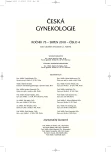-
Medical journals
- Career
Perinatal brachial plexus palsy
Authors: J. Macko
Authors‘ workplace: Novorozenecké oddělení Krajské nemocnice T. Bati, a. s., Zlín, primář oddělení MUDr. J. Macko
Published in: Ceska Gynekol 2010; 75(4): 279-283
Overview
Upper limbs palsy as a result of affliction of plexus brachialis nervous bunch is disorder, whose frequency moves among 0.42–5.1 / 1000 liveborn children. Delivery mechanism itself certain weighty, no however only cause rising paralysis. Some way paralysis rise already intrauterinne, some way then at surgical childbirth per sectionem caeseream. Brachial plexus palsy isn’t benign disorder. If isn’t this disorder in time diagnosed and accordingly treated, child threatens late aftermath, especially significant limitation of limbs movement with functional consequencies.
Key words:
paralysis (palsy), brachial plexus, delivery mechanism.
Sources
1. Bialocerkowski, A., Kurlowicz, K., Vladusic, S., Grimmer, K. Effectiveness of primary conservative management for infants with obstetric brachial plexus palsy. Inter J Evidence Based Healthcare 2005, 3 (2), p. 27–44.
2. Borschel, GH. Brachial plexus palsy clinic. Plastic Reconstruct Surg 2006, 117(7), p. 2235-2242.
3. Pondaag, W., Malessy, MJA., et al. Natural history of obstetric brachial plexus palsy: systematic review Developmental Medicine & Child Neurology 2004, 46, p. 138–144.
4. Haerle, M., Gilbert, A. Management of complete obstetric brachial plexus lesions. J Pediatr Orthop 2004, 24(2), p. 194-200.
5. Medlock, MD., Hanigan, WC. Neurologic birth trauma. Intracranial, spinal cord, and brachial plexus injury. Clin Perinatol 1997, 24(4), p. 845-857.
6. Patel, RR., Murphy, DJ. Forceps delivery in modern obstetric practice. BMJ 2004, 328(7451), p. 1302-1305.
7. Farnoff, AA., Martin, RJ., eds. Neonatal-perinatal medicine: Diseases of the fetus and infant. St. Louis, Mo: Mosby; 1996.
8. al-Qattan, MM., el-Sayed, AA., al-Kharfy, TM., al-Jurayyan, NA. Obstetrical brachial plexus injury in newborn babies delivered by caesarean section. J Hand Surg [Br] 1996, 21(2), p. 263-265.
9. Bae, DS., Waters, PM., Zurakowski, D. Reliability of three classification systems measuring active motion in brachial plexus birth palsy. J Bone Joint Surg Am 2003, 85-A(9), p. 1733-1738.
10. Aszmann, OC., Korak, KJ., Kropf, N., et al. Simultaneous GDNF and BDNF application leads to increased motoneuron survival and improved functional outcome in an experimental model for obstetric brachial plexus lesions. Plast Reconstr Surg 2002, 110(4), p. 1066-1072.
11. Belzberg, AJ., Dorsi, MJ., Storm, PB., Moriarity, JL. Surgical repair of brachial plexus injury: a multinational survey of experienced peripheral nerve surgeons. J Neurosurg, 2004, 101(3), p. 365-376.
12. Grossman, JA., DiTaranto, P., Price, A., et al. Multidisciplinary management of brachial plexus birth injuries: 2004. The Miami experience. Semin Plast Surg 2004, 18(4), p. 319-326.
13. Ramos, LE., Zell, JP. Rehabilitation program for children with brachial plexus and peripheral nerve injury. Semin Pediatr Neurol 2000, 7(1), p. 52-57.
14. Strombeck, C., Krumlinde-Sundholm, L., Forssberg, H. Functional outcome at 5 years in children with obstetrical brachial plexus palsy with and without microsurgical reconstruction. Dev Med Child Neurol 2000, 42(3), p. 148-157.
15. Dunham, EA. Obstetrical brachial plexus palsy. Orthopaed Nurs 2003, 22, 2.
16. Mehta, SH., Blackwell, SC., Bujold, E., Sokol, RJ. What factors are associated with neonatal injury following shoulder dystocia? J Perinat 2006, 26, p. 85–88.
Labels
Paediatric gynaecology Gynaecology and obstetrics Reproduction medicine
Article was published inCzech Gynaecology

2010 Issue 4-
All articles in this issue
- Ethics in neonatal intensive care
- Shoulder dystocia during vaginal delivery
- Analysis of cell free fetal DNA fragmentation rate in pregnant women during the course of gravidit
- DNA analysis on Y chromosomal AZF region deletions in Slovak population
- Guideline for prevention of RhD alloimmunization in RhD negative women
- Pregnant women alloimmunisation of non-RhD erythrocyte antigens: review article
- Perinatal brachial plexus palsy
- Repair of the 3rd and 4th degree obstetric perineal tear
- Severe obstetrical injuries and anal incontinence
-
Rekombinantní aktivovaný faktor VII (rFVIIa) v léčbě závažného poporodního krvácení
Data z registru UniSeven v České republice -
Trombotická trombocytopenická purpura v těhotenství
Kazuistika - Uterine rupture in pregnancy - case study
- Local sperm antibodies and general levels of immunoglobulins in ovulatory cervical mucus
- Measurement of bone mineral density by heel ultrasound and forearm DXA in clinical practice
- Complications of radical oncogynecological operations
- Process of women’s reproductive ageing – causes, evaluation and possible clinical usage
- Czech Gynaecology
- Journal archive
- Current issue
- Online only
- About the journal
Most read in this issue- Shoulder dystocia during vaginal delivery
- Repair of the 3rd and 4th degree obstetric perineal tear
- Perinatal brachial plexus palsy
- Complications of radical oncogynecological operations
Login#ADS_BOTTOM_SCRIPTS#Forgotten passwordEnter the email address that you registered with. We will send you instructions on how to set a new password.
- Career

